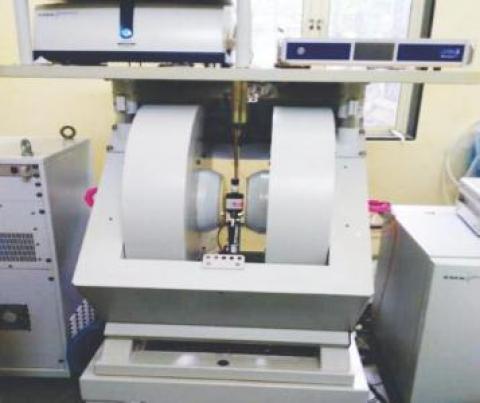
External users: registration to be carried out only through I-STEM portal
Additional information about sample and analysis details should be filled in the pdf form provided in the I-STEM portal under “DOWNLOAD CSRF”
Internal users (IITB): registration to be carried out only through DRONA portal
Additional information about sample and analysis details should be filled in the pdf form provided here.
.
Category
- Spectroscopy and Spectrometry » ESR Spectroscopy
Booking Details
Q-band measurement at R.T. and 100K
Facility Management Team and Location
Facility Features, Working Principle and Specifications
Facility Description
This EPR machine is designed by Bruker company. In the present facility, there are two frequency modes, viz., X-band work on range 9-10 GHz, and Q-band working on 30-35 GHz. The available electromagnet can provide a magnetic field of upto 13 kOe.
Features
- Variable temperature EPR (X and Q-band) measurement(5K-300K)
- Single crystal measurement
- Finger dewarn A
- Working Principles
- An EPR experiment the field of the spectrometer magnet is swept linearly to excite some of the electrons in the lower energy level to the upper energy level while the sample is exposed to fixed microwave irradiation. The free or the upaired electrons have a small magnetic field and orient themselves parallel to the larger field produced by the spectrometer's magnet. At a particular magnetic field strength the microwave irradiation will cause some of the free electrons to "flip" and orient against the spectrometer's magnetic field. This separation between the lower and the higher energy level is exactly matched by our microwave frequency. The condition where the magnetic field and the microwave frequency are "just right" to produce an EPR resonance (or absorption) is known as the resonance condition is detected by the spectrometer.
- Digital Ultra High Resolution Hall Field Controller
Microwave Bridge: Type EMX-m40X(X-band)
Source: solid state microwave source;
Frequency range: 9,3 to 9,9 GHz
low noise: -130dBc/ 100 kHz from carrier
maximum source output : 200mW
phase sensitive detection
integrated frequency counter with 1 kHz resolution
Frequency Tuning:
tune bandwidth: 8 MHz,
suitable for standard resonator types
Automatic Frequency Control(AFC):
AFC lock range: 4 MHz
digital adjustment for modulation amplitude and gain
AFC stability: 10-8
Microwave Power Setting:
Attenuation : 60dB max
automatic phase correction over attenuation range,
Microwave Reference Arm:
Reference Arm with microwave attenuation and phase shifter,
Signal Amplifier: low noise preamplifier,
20 Hz to 600 kHz,
two 50 Ohm signal outputs
Resonator Tuning and Matching:
the system features "auto tuning" and "auto matching"
for most probeheads via iris
Q-factor Display:
the system evaluates the probehead (resonator) and
displays the loaded Q-Factor.
All parameters of the bridge are software controlled
High Sensitivity Probe (Type 2)
with optical window for CW-EPR in X-Band: - 10 mm sample access
- 20 G maximum modulation amplitude
- automatic cavity matching
- forlossy and non-lossy samples
- compatible with ER 4131VT and ER 4112HV
- unloaded Q > 15.000
- Sensitivity: Weak Pitch 1200 : 1 Absolute 2.5 x 109 spins / G
Q-Band Microwave Bridge with frequency counter
microwave source: Gunn
Operating frequency: 34 GHz
max. Power: 100 mW
operating range: 100 MHz
attenautaion precision: +/- 0.2dB
attenuation resolution: 1 dB
attenuation max.: 60 dB
Signal bandwidth: 30 Hz to 400 kHz
Integrated frequency counter with 1 kHz resolution
ER 5106QT
Cavity for room-, nitrogen, helium temperatures (X-band)
Helium Cryostat, 3.8 K to 300 K (Q-band)
with 5 mm optical window,compatible with ER 4112HV-1020 control system(including cryostat holder), used for Flexline,K- and Q-Band resonators.
ER 5106QT
Electrolytic cell assembly (X-band)
Single crystal EPR measurement One axis Goniometer
Sample Preparation, User Instructions and Precautionary Measures
- For X-band:
- Minimum 40-50 mg sample is needed for solid state measurement
- For solution state measurement 1 x 10-2 M (provide the preferable solvent to dissolve your sample (avoid using highly polar solvent for measurement))
- For Q-band:
- Minimum 5-20 mg sample is needed for solid state measurement
- For solution state measurement 1 x 10-3 M (provide the preferable solvent to dissolve your sample (avoid using highly polar solvent for measurement))
- Registered user will be allotted time as per queue.
- User should submit the samples to the EPR lab between 9:30 AM and 11:00 AM on the scheduled day.
- Samples will be loaded in to the system on the submitted day and analysis will be carried out after 4 to 6 hours or on the next day. Data will be sent through email.
Charges for Analytical Services in Different Categories
| Institution/experiments | Internal user X-/Q-band | Academic Institution X-band/Q-band | National lab X-band/Q-band | Industries X-band/Q-band |
Room temperature X and Q band (per sample) | 190/200 | 375/400 | 1050/1200 | 1875/2000 |
Liquid Nitrogen experiments X and Q band (per sample) | 250/300 | 500/750 | 1500/1750 | 2500/3000 |
Varibale temperature EPR (per sample and per temperature) | 250/300 | 500/750 | 1500/1750 | 2500/3000 |
Liquid He experiments X and Q bands (per hour) | 4250/- | 8500/- | 10000/- | 12000/- |
Applications
- Interaction between the unpaired electron in the system (Organic or Inorganic complexes)
- To find out the geometry around metal ions (particularly useful in biology Example: active site of enzymes and metalloproteinase)
- EPR imaging
- Radicals trapping
- Probing the radical mechanism of chemical and biological catalysis reaction
- To probe mechanism of Radical polymerization
- Spin labelling experiments
- Quantitative absolute concentration measurements
